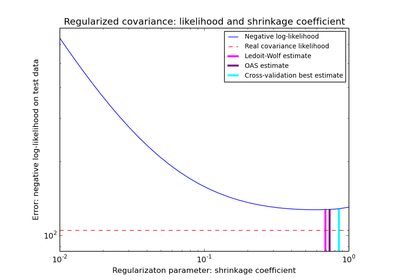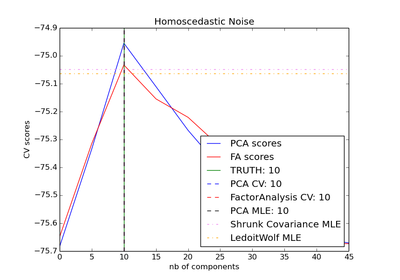sklearn.covariance.ShrunkCovariance¶
- class sklearn.covariance.ShrunkCovariance(store_precision=True, assume_centered=False, shrinkage=0.1)¶
Covariance estimator with shrinkage
Parameters: store_precision : bool
Specify if the estimated precision is stored
shrinkage : float, 0 <= shrinkage <= 1
Coefficient in the convex combination used for the computation of the shrunk estimate.
Attributes: `covariance_` : array-like, shape (n_features, n_features)
Estimated covariance matrix
`precision_` : array-like, shape (n_features, n_features)
Estimated pseudo inverse matrix. (stored only if store_precision is True)
`shrinkage` : float, 0 <= shrinkage <= 1
Coefficient in the convex combination used for the computation of the shrunk estimate.
Notes
The regularized covariance is given by
- (1 - shrinkage)*cov
- shrinkage*mu*np.identity(n_features)
where mu = trace(cov) / n_features
Methods
error_norm(comp_cov[, norm, scaling, squared]) Computes the Mean Squared Error between two covariance estimators. fit(X[, y]) Fits the shrunk covariance model according to the given training data and parameters. get_params([deep]) Get parameters for this estimator. get_precision() Getter for the precision matrix. mahalanobis(observations) Computes the Mahalanobis distances of given observations. score(X_test[, y]) Computes the log-likelihood of a Gaussian data set with self.covariance_ as an estimator of its covariance matrix. set_params(**params) Set the parameters of this estimator. - __init__(store_precision=True, assume_centered=False, shrinkage=0.1)¶
- error_norm(comp_cov, norm='frobenius', scaling=True, squared=True)¶
Computes the Mean Squared Error between two covariance estimators. (In the sense of the Frobenius norm).
Parameters: comp_cov : array-like, shape = [n_features, n_features]
The covariance to compare with.
norm : str
The type of norm used to compute the error. Available error types: - ‘frobenius’ (default): sqrt(tr(A^t.A)) - ‘spectral’: sqrt(max(eigenvalues(A^t.A)) where A is the error (comp_cov - self.covariance_).
scaling : bool
If True (default), the squared error norm is divided by n_features. If False, the squared error norm is not rescaled.
squared : bool
Whether to compute the squared error norm or the error norm. If True (default), the squared error norm is returned. If False, the error norm is returned.
Returns: The Mean Squared Error (in the sense of the Frobenius norm) between :
`self` and `comp_cov` covariance estimators. :
- fit(X, y=None)¶
Fits the shrunk covariance model according to the given training data and parameters.
Parameters: X : array-like, shape = [n_samples, n_features]
Training data, where n_samples is the number of samples and n_features is the number of features.
y : not used, present for API consistence purpose.
assume_centered : Boolean
If True, data are not centered before computation. Useful to work with data whose mean is significantly equal to zero but is not exactly zero. If False, data are centered before computation.
Returns: self : object
Returns self.
- get_params(deep=True)¶
Get parameters for this estimator.
Parameters: deep: boolean, optional :
If True, will return the parameters for this estimator and contained subobjects that are estimators.
Returns: params : mapping of string to any
Parameter names mapped to their values.
- get_precision()¶
Getter for the precision matrix.
Returns: `precision_` : array-like,
The precision matrix associated to the current covariance object.
- mahalanobis(observations)¶
Computes the Mahalanobis distances of given observations.
The provided observations are assumed to be centered. One may want to center them using a location estimate first.
Parameters: observations : array-like, shape = [n_observations, n_features]
The observations, the Mahalanobis distances of the which we compute. Observations are assumed to be drawn from the same distribution than the data used in fit (including centering).
Returns: mahalanobis_distance : array, shape = [n_observations,]
Mahalanobis distances of the observations.
- score(X_test, y=None)¶
Computes the log-likelihood of a Gaussian data set with self.covariance_ as an estimator of its covariance matrix.
Parameters: X_test : array-like, shape = [n_samples, n_features]
Test data of which we compute the likelihood, where n_samples is the number of samples and n_features is the number of features. X_test is assumed to be drawn from the same distribution than the data used in fit (including centering).
y : not used, present for API consistence purpose.
Returns: res : float
The likelihood of the data set with self.covariance_ as an estimator of its covariance matrix.
- set_params(**params)¶
Set the parameters of this estimator.
The method works on simple estimators as well as on nested objects (such as pipelines). The former have parameters of the form <component>__<parameter> so that it’s possible to update each component of a nested object.
Returns: self :



